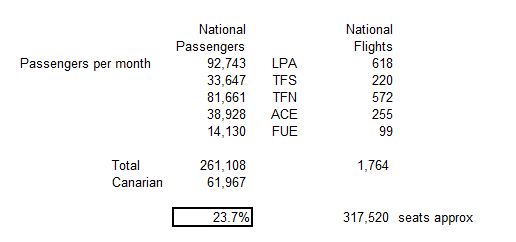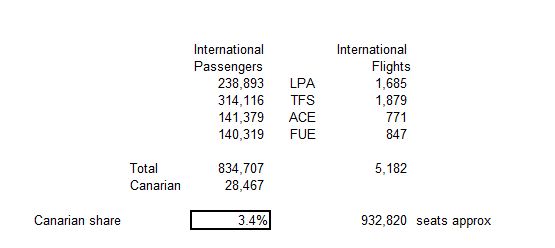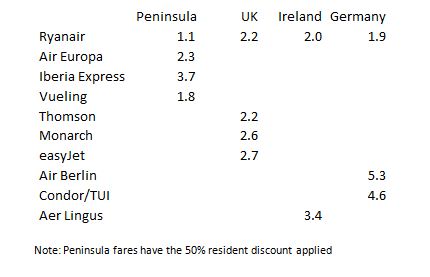I have recently had tussles with people on Facebook on this subject. One person suggested that:
Passengers do really care about flying with their own Canarian airline. I could say most certainly that passengers from the Canary Islands do want to fly with their own Canarian flagged company, especially when flights go as far as the UK, as it would be the first Canarian company to do so, therefore the definition of a Canarian airline it’s quite relevant for us. For us Canarians that means a lot, as we are born and bred in here.
So, the question arises whether a Canarian airline can simultaneously appeal to Canarian patriotism and be a viable entity.
According to government data sources, Canarians in 2012 made around 62,000 departures per month to the Peninsula and 28,500 international trips. So, how do these relate to overall capacity and passenger volumes for all travellers, including non-Canarians?
National Trips
From the “big four” islands, there are roughly 260,000 return trips to the Peninsula, of which some 62,000 are taken by residents of the Canary Islands (including La Palma, La Gomera and El Hierro). This means that Canarians account for a little under one quarter of national trips, excluding inter-island flights.
As a check on the data, an average aircraft size of 180 seats has been assumed for national trips and this equates to a load factor of around 82%.
International Trips
A priori, it would be expected that the trip rate for Canarian residents for international trips is rather lower and, in 2012, the estimate was around 340,000 trips or 28,500 per month. By contrast, we would expect foreign nationals to be more dominant on international routes and, as the figure below demonstrates, these foreign nationals account for over 96% of international trips.
The load factor check yields a figure of 89%. This is probably slightly high, but Ryanair, for example, consistently has a load factor in excess of 90% on its flights to and from the Canary Islands.
So, we are now in a position to address the question of whether a Canarian airline can rely on its home market as a viable business model. Assuming that Canarian residents were willing to pay a premium to fly with a locally-based airline or, at the very least, would always choose a Canarian airline to fly if prices, frequencies and schedules were not too different from non-Canarian competitors, then it could be argued that a model based on supporting businesses has some chance of succeeding, as far as national routes are concerned.
On fare grounds alone, there appears to be a gap in the market for Peninsula trips. The table below shows the price in cents per kilometre between Lanzarote and major markets. The fares examined were for a 7 day trip leaving Lanzarote on 25th January 2014 and the searches were undertaken at the end of November 2013.
When it comes to international routes however, no airline can hope to succeed when its home market is so small, less than 5% of the total. Even if we made the (highly unlikely) assumption that all Canarian resident trips abroad were to the UK (291,000 per month in 2012) the Canarian share would still not reach 10% of the total.
What is more, although there is no data to support the argument, it is likely that a significant proportion of the 3.4% international trips originating in the Canary Islands are undertaken by foreign residents visiting their “home” country, so any appeal to Canarian patriotism will fall on deaf ears.
In the same way that Samsung can only gain success with its electronic products by having international appeal – South Korea’s population of 50 million accounts for just 0.7% of the global total – the same applies to airlines with a small home market; this is especially the case where potential for long distance transit traffic is negligible. Airlines with small home markets which have had success in developing profitable operations in the past have only succeeded in doing so by becoming transit hubs and, more importantly, having a global appeal.




